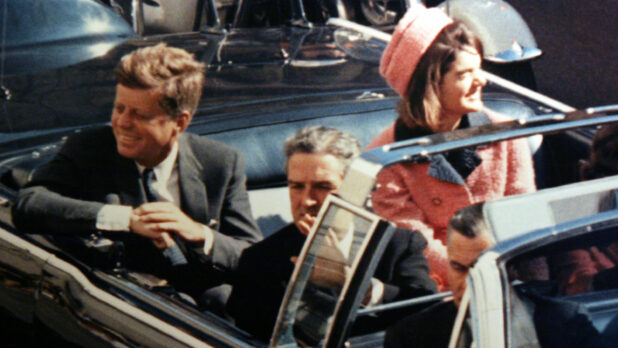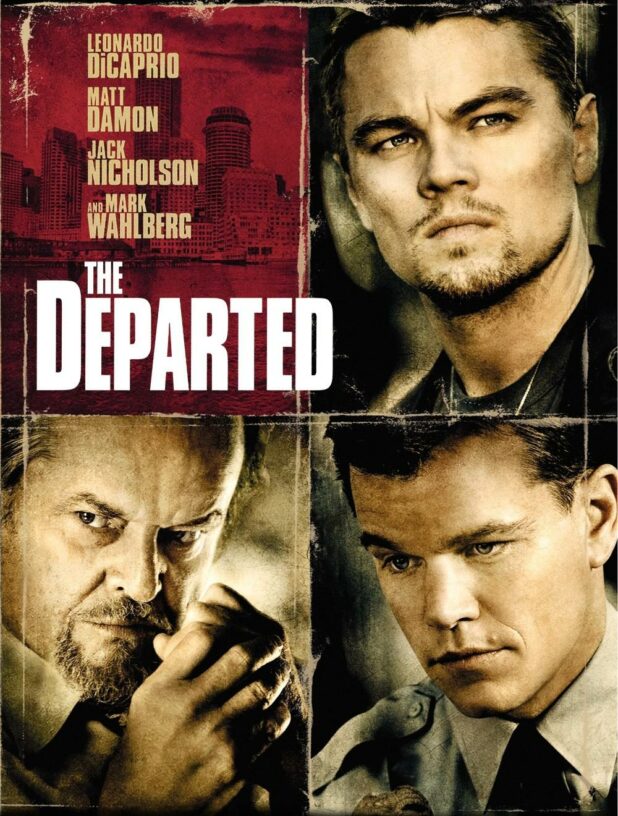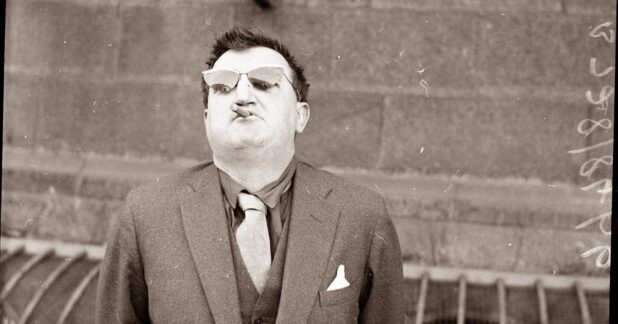Six of my eight great-grandparents were ethnically Irish. Two were German (or at least Germanic; my father’s grandfather was from Sweden, though I think he might have been a member of a German minority there – that’s never been clear).
Last night, I watched “The Departed,” a Martin Scorsese film about Boston Irish cops fighting Boston Irish criminals. I had never seen it before, which is strange. It seems I was only meant to watch it right now. All of a sudden, watching the film, I started thinking a lot about my Irishness and my own Irish identity, which is something I’ve never really done before, which led to further personal revelations.
I’ve considered small things, like my personal life obsession with the Catholic Church (I was raised Protestant, through unfortunate circumstance) being in my blood, but the concept of an “Irish identity” has never been something I’ve considered. I am from Ohio. There is no real consciousness of ethnic identity there. There was, however many years ago, but we’re all Americans now.

I’ve thought so much about blood and race, it’s strange I’ve not considered the Irish thing much.
In fact, I’ve actually had some kind of hostility towards Irish identity. I’ve viewed them as whiny, moaning about how the British took their potatoes, and anti-social. I’ve also heavily criticized the East Coast American-Irish for their hostility against American identity (which is very real – every single non-Jew news host, excluding Tucker Carlson, is Irish, and the Washington establishment is peppered with Irishmen who hate America). Part of the realization – and this takes a minute – was that hostility or loathing for Irish identity is a part of Irish identity. This is seen in the history. There is a self-destructiveness collectively among the Irish that means that the tragedy of the Irish cannot be completely accredited to the English/British.
My own grandparents and great-grandparents must have had some loathing towards Irishness, or they would have maintained it, and not stopped going to church. However, some of it might be the fact that moving to Appalachia after the Civil War meant a disconnection from the ethnic identity. Both my grandfathers were very private men, and I just don’t know the details. I spent a lot of time talking to my maternal grandmother about ancestry, and she had no explanation for why Irish people were not Catholic. My paternal grandfather was apparently a lapsed Catholic (or his parents were). Irishness was only mentioned in my extended family, really, as an explanation for overconsumption of alcohol, or in a vague way that implied society has always been against us. In my immediate family, there was none of that. But on my mother’s side, which is purely Irish, there were comments in extended family, which never really seemed to be meaningful. Now, I find that this island and its curses were looming over all of it.
In The Departed, there is also constant conflict between the Irishmen, which is the whole theme of the film. All of the cops and criminals are Irish. This is different from the Scorsese Italian crime films, where the cops are always Anglo/non-ethnic.
This is not a film review, but the film is very good. In terms of Martin Scorsese films, it is probably the median average: half of his films are better, half not as good. It’s better than the low-end (Bring Out the Dead, The Color of Money), definitely better than “The Irishman” (in which Robert De Niro literally plays the titular character), but not as good as Taxi Driver, Goodfellas, or Gangs of New York. There were a couple things that I noted as script problems, but they were plot related (a lot of good films have plot problems – it appears to be the most difficult or least considered element of film-making). Characters and themes were 100% on point.
Leonardo DiCaprio is not Irish, which bothered me slightly. Leo is nearly as handsome as an Irishman, but it bothers me that a German named “DiCaprio” (Italian paternal grandfather) is the iconic Irishman in both The Departed and Gangs of New York (I think Jack in Titanic would probably also have been Irish). Matt Damon is also not Irish (though he is from Boston and could do the accent). Mark Wahlberg is majority Irish blood and from Boston, Martin Sheen is half-Irish, Jack Nicholson is majority Irish. I think there are enough Irish actors that the whole cast could have been Irish (or at least half-Irish), instead of featuring DiCaprio and Damon in “potato face.” That said, both actors do a convincing performance. You believe they’re Irish.
Towards the beginning of the film, I started seeing myself in these characters, and by the end of the film, I had connected all of my available brain logs regarding the Irish and reviewed them. I paused the film several times to scan my brain for my knowledge of the Irish and to review my own identity and personal history.
When the credits rolled, I looked at my hands, and thought about where they’d been. Then, I got up, looked in the mirror, and thought about where this man I am had been, before I was born. This is what our ancestors are, aren’t they? “The men we were before we were born.”
[REDACTED: IRA joke I don’t want to see quoted out of context in a court filing – please imagine joke now.]
I thought about the homeland. Mother Ireland. The Eire.
Because I have a brain tumor and am experiencing heavy religious delusions, I was able to visualize myself there in those fields, standing on the cliffs, drinking, dancing at a wedding, fighting, crying before the altar and praying the rosary, having my skull smashed in by the axe of some Swedish faggot who’d come for my women and potatoes (as well as hiding with the priest in a secret place in the church as a boy, peeking out and watching my father’s skull get smashed).
I then thought about that The Pogues song “Thousands are Sailing,” and the way we left the Eire on doomed ships, the way Lincoln lined us up and sent us to die on an industrial scale in his stupid self-righteous war on the promise of a plot of land to grow our potatoes, should we survive the bloodbath.
I’m not claiming to have channeled past lives as part of a religious delusion, but it was something like that. I am a Christian and I don’t believe in reincarnation, but I do believe we carry with us the imprint of our ancestors in a heavy way.
I realized that this dreadful island, which I’ve never been to, and which has never really occupied much of my thoughts, has defined my identity, my personality, and my behavior.
I am a man, of course, and I’ve made my own decisions, but I’ve done so within the body of an Irishman, with the mind and instincts of an Irishman.
I then remembered something that I had indeed thought about: every single person I’ve ever been truly close to in my life has been Irish or half Irish. (Though not all American, all were diaspora – I think there is a significant line between the current population of the Motherland and the diaspora, and there is hostility between the two groups, maybe like the hostility between the adult children of embarrassing drunk parents and said parents. I’ve never known an Irishman raised in Ireland.)
How strong the blood is!
These are my personality traits:
- Rebelliousness and general hostility towards authority
- Alcohol
- Purposefully putting myself in a situation to be persecuted
- Wallowing in personal misery and guilt
- Anger/confrontation/aggression/violence (I’ve mostly managed that, but trust me, I was born with it)
- Sentimentality
- Self-destructive personal sense of justice/revenge
- Aggressive religiosity or, conversely, self-destructive rebelliousness against and anger at God (I’ve never embraced the latter, though it’s always hung there as an option, whereas denial of the existence of God has never been an option on the table – it’s a sense of “He’s there, what are you going to do about that?”)
Martin Scorsese is American-Italian, and has no doubt thought a lot about the American-Irish, and contrasted and compared the two groups (which are not particularly similar, despite the fact that they are both criminal Catholic immigrant groups, and maybe experience some kinship because of the overlap, alongside the animosity), so the film had a lot of these concepts in it. On the point of aggressive religiosity vs. self-destructive anger against God (which is probably the defining aspect of being Irish – this choice, which is so extreme in either direction), Martin Sheen as a top cop was the devout Catholic, while Jack Nicholson as a top criminal had a seething hatred towards God and the Church – while both were defined by their Irish identities.
It’s a minor spoiler (it’s not really a spoiler, because the character is based on Whitey Bulger), but the top Irish criminal, the Nicholson character, ends up being linked to the FBI, which is in a way betraying the Irish to the English. When one of the cops suggests calling in the FBI to help deal with a crime situation that has gotten out of control, the Sheen character says “fuck the feds – they’re compromised,” which means “this is a Boston issue,” i.e., “this is a matter between Irishmen.”
This dread and struggle and sense of justice/revenge (justice and revenge are not the same thing, but I think they are for the Irish) was on both sides of the police/crime line, and the line was constantly blurred. In some sense, you get that the Irish had purposefully created this struggle between each other, because they had a drive to experience this intensity. Germans, for example, do not have this character. They don’t have the tendency towards criminality and violence generally, but they don’t form natural animosity between each other. At one point, the Mark Wahlberg character calls the Leo DiCaprio character a “lace-curtain Irish faggot” (you were still allowed to say “faggot” in a movie in 2006, apparently), and this is a real animosity that working class Irish had for middle-class Irish.
Scorsese included the alleged Freud quote that “psychoanalysis doesn’t work on the Irish,” which is a very content heavy line. It’s not a real quote, I don’t think (it’s not in any of his books), but I don’t really care about what that kike says anyway, it’s the concept of the thing. Why would psychoanalysis work on everyone but the Irish? I realize now I could explain that, but it would be a very long article. I don’t have time for that now – I’m embracing my Irish identity, so I have an appointment to drink until my face is red and then get in a fight with a stranger and go to jail.
No, but seriously, I’m thinking of getting a tattoo of a 4-leaf clover or a leprechaun or something.
Maybe I’ll just get a ball cap.
The film is long, but it wasn’t enough to gather all of this information. What it did for me was make a whole bunch of connections, and pull up everything I know about the Irish to the front of my brain, and overlap it with my own life. It was like turning a key in my brain – rattle, click, open.
It’s not the greatest of the Illness Revelations, but it’s an interesting one. In some sense, it’s as personal as anything ever could be, but also not a private matter. Through our very important parasocial relationship (which is very healthy and normal), you already know a lot about my personality and my life arc.
For a moment, looking in the mirror at my potato face, and imaging this face being worn by generations of drunken Catholic fighters against the world, I said “I need to have an Irish bride, and ensure this process continues forever.”
Then, quickly, I said: “Nah. Let me go, boys.”
Addendum: “Am I Irish?”
I would have preferred to end this with that song. It’s a neat bow. After having described the experience of the Irish, I suggest, quite cleverly, that I shouldn’t marry an Irish girl, because my descendants would be better off without it. (There are many clever things like this in my writing, and I wonder what percentage of the audience picks up on them. However, my main concern is that these things are understood after I’m dead.)
However, I know there are a lot of Americans reading this and trying to figure out their background to see if this “Irish identity” problem applies to their life.
Obviously, there is no total equation to make this clear. I am only 75% Irish, but have determined my character is 100% Irish. A lot of Ireland-Irish would be 25% English/Scottish/Welsh (they would deny it, but it’s true), so I would say anyone with 3 Irish grandparents has the “blood of the potatomen” pumping in his veins.
When we get to 50%, it’s more complicated.
In some ways, I think I have a less personal understanding of my 50% Irish father than I do my 100% Irish maternal grandfather (the latter was mentioned in a previous Illness Revelations piece, and though I never actually knew him, he sort of hangs over me in a way where, at any moment, whenever I’m doing anything, I feel I could look behind me and find him either nodding in agreement or scoffing in disgust). This is a man I have no trouble picturing [REDACTED: Second IRA joke I don’t want to see in a court filing – please imagine it now]. He was so filled with rage, he gave so much of himself to it. The same is probably true of my father, though there is so much difference between the two men. (Please note: my father is still alive, so there is a limited amount I can write about him in good conscience. That last sentence is probably the outer limits of what I’m comfortable with until the Old Man goes to be with Jesus, at which point, it will probably be necessary to publish several books’ worth of text.)
However, a 50% Irish person is not free of being haunted by the curses of that island over there.
Probably, “Germanics,” collectively, are “default white people.” I think this includes the British and Scandinavians. I think “ethnic” genes – Irish, Italian, Spanish, Greek, Slavic – carry a heavier weight on a person’s character than “default white people” genes. This is like mixing white paint and blue paint – you have a lighter shade of blue. Less metaphorically, it’s the same thing with mulattoes. Mulattoes are basically black people, even though they are smarter and have lighter skin. The black parent is the defining variable. So I think a half-Irish and half-German/Scottish/English/Scando person is probably more Irish than not. A 50-50 mix between Italian and Irish though is just that – half Irish, half Italian. Their character is a mix of those things. One of my close friends in life was that. It appears difficult, though being Irish is also difficult. (Yo, let’s be real – being alive is difficult.)
Anything less than 50% though, while you might have some lingering trait – tendency towards “alcoholism” (which is a hoax, by the way – regular drinking is healthy) – you’re not going to have significant Irish character.
It’s fine to just be a “generic white American.” That’s what I considered myself until a few hours ago. There is no need for the kind of reflection on ancestry that I’ve just done here, unless it is personally useful. All white people have a shared genotype, phenotype, and a shared identity in Christianity. White Americans have a shared language and cultural identity (I don’t feel that considering ethnic identity takes away from American identity – I have zero connection to the island, and am considering my personal psychological makeup).
I’ve constantly been identified as Russian (or maybe “accused of being Russian”). I could speak fluent Russian and tell people I’m Russian, and no one would know the difference. I wouldn’t ever have the Russian autism-like characteristics or ability to maintain incredible calm when it shouldn’t (by the rules I understand) be possible to do so. (This ability of the Russian and probably the Slav generally to maintain a calm is an incredible feature. Anyone who knows the Russians knows what it is. I think I could pretend to have the autistic-type Russian traits, but I couldn’t fake that calm.) But I could drink profusely and be morbid and miserable, with my round face, and no one would ever know I wasn’t Russian. I could pretend to be German or whatever too (in theory – probably not in reality). I don’t look Germanish, but my face is not that far outside of the range that people would not believe it.
Point being: “generic white person” is a valid identity and character, and the “traditional American” generic white character is not totally different from British or even German. Obviously, there are some cultural differences with the Germans. There are no core cultural differences between “normal American” culture and British culture. The differences are aesthetic and related to the colonial/diaspora experience. Therefore, actually, the people with a character most like Americans are Australians. They are virtually identical, and even have this Irish diaspora (one of the few close personal friends of my life was Australian-Irish). Antagonism with the Irish might be a defining factor of English identity (and might be why they abandoned Catholicism, as a way to draw a line with the Irish).
If you do have an Irish identity, and this resonates with you, that’s fine. It’s also fine if not. I wouldn’t be thinking “oh no, I’ve got the potato curse” and I wouldn’t be thinking “wow, that’s interesting, wish I was Irish.” Like anything of any magnitude in this life, it’s a blessing and a curse. My Irishness is a blessing for you, dear reader, because if this was not who I am, I’d be doing something else. It’s mostly a curse for me. But there are bright parts.







